Thailand has been considering the implementation of a salt tax for several years now since as far back as 2018, but has yet to be formally legislated much less enforced even though discussion was previously rife about a potential 2021 implementation.
According to industry experts, the regulations still remain in the planning stage as of late 2022 due to both the technical challenges involved as well as both industry and government hopes that other more all-rounded solutions can be used instead of taxation.
“At the end of the day, consumption is a consumer decision, and to facilitate them making the right decision it is important to provide them with the right environment to do so including the right products as well as education and communication,” Food Science and Technology Association of Thailand (FoSTAT) President Asst Professor Anadi Nitithamyong told FoodNavigator-Asia.
“My personal opinion is that this is far better than forcing them into certain choices via taxation, and indeed there are many ways to create this environment which the industry and especially brand manufacturers are currently implementing such as reformulation to reduce sodium and meeting criteria to attain the healthier choice logo.
“This is no small chore as the technical challenges are immense – salt is sodium chloride (NaCl) which is not only used for taste but also various other functions in food manufacturing including food safety and shelf life preservation, so a lot of adjustments need to be made.
“If a hasty decision is made in this area to remove salt, the only way out for manufacturers might be to turn to artificial additives to make up for some of these functionalities – which could be even worse for public health in the long run.”
Natural solutions available, but more research still needed
Various potential alternatives to NaCl do already exist in the market, but according to Prof Nitithamyong much more work is still needed to find the right alternatives for the various products as well as the most suitable amounts and means of reformulation.
“Sodium reduction cannot be rushed, the best way to reduce this is to cut salt use gradually, so gradually that consumers don’t really notice it and their palates can slowly get used to this reduction,” she said.
“There also already exist some natural alternatives to salt that can be used such as potassium chloride (KCl) which is lower in sodium and thus medically theorised to be healthier, especially for heat conditions.
“The other option is to just reduce salt use but add spices or herbs to enhance the flavour of food. Both of these have their own pros and cons, but don’t taste exactly the same as NaCl, so a lot of research is still needed.”
When asked whether monosodium glutamate (MSG) could be a potential widespread solution to the salt conundrum, Prof Nitithamyong highlighted that depending on the problem to be solved, MSG could still have more sodium than required to address problems.
“MSG still has sodium as evidenced by its name, and in actuality is another target that the government is looking at reducing,” she said.
“It is used widely in street food and there are ongoing programmes to educate consumers and vendors about it – but actually there are also potential uses here to reduce salt consumption e.g. cutting the salt levels and using a little bit of MSG so there is less sodium but enough flavour.”





